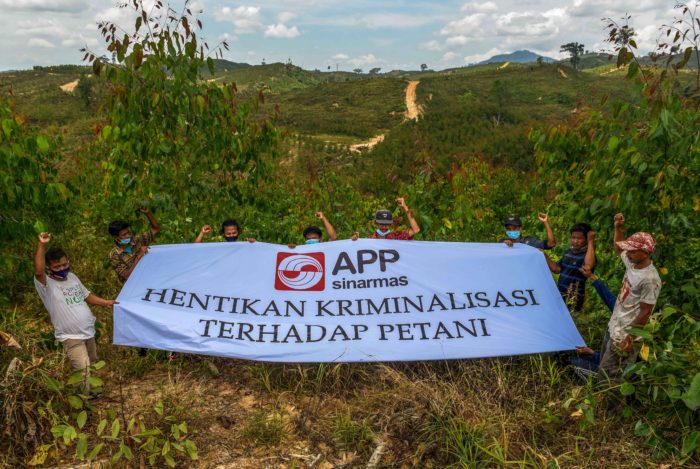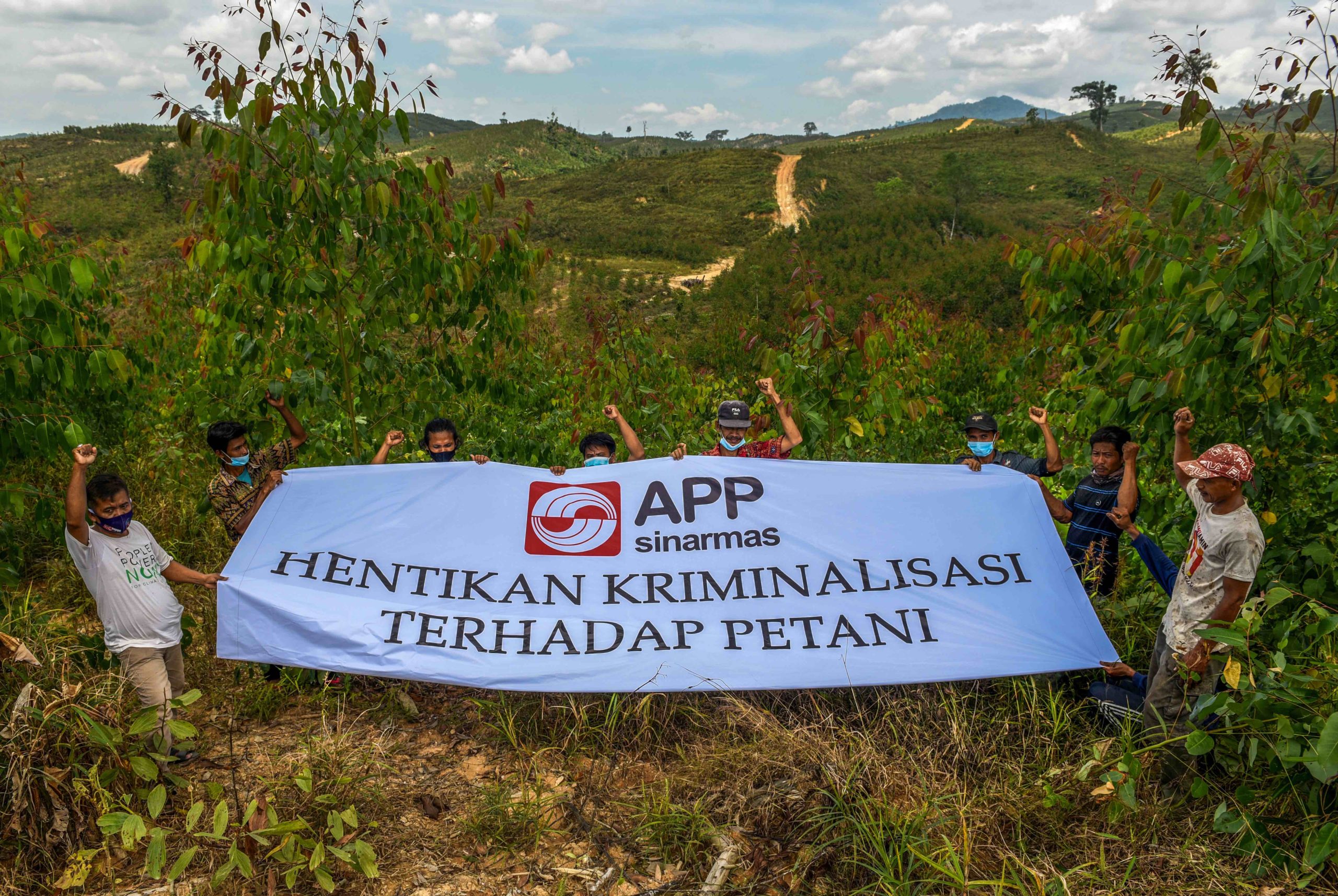As global leaders, activists, and Indigenous Peoples around the world gather for the UNFCCC Climate Conference in Glasgow, two farm workers were detained by Indonesian police in Jambi, Indonesia, for working on community lands disputed by pulp and paper company PT. Wira Karya Sakti (WKS), a subsidiary of Sinar Mas Group’s pulp arm Asia Pulp and Paper (APP). The Sinar Mas Group (SMG) is one of the largest conglomerates in Indonesia and controls 3.1 million hectares, roughly the size of Belgium, of palm oil and pulp and paper plantations across Indonesia.
As the climate crisis intensifies, so too have the attacks against land and environmental defenders. 2020 was the most dangerous year on record for people defending their land and livelihoods with 227 lethal attacks documented. The industries most responsible for deforestation such as agribusiness, mining and logging are the same ones that are most responsible for killing these people who were doing nothing but defending their home and their communities.
Sinar Mas Group is trying to criminalize farm workers working community lands
According to reports by the non-profit Indonesian Forum for the Environment (WALHI) Jambi, an affiliate of Friends of the Earth, the two young farm workers, brothers named Sahrul and Suwandi, were working to clear shrubs on a piece of land belonging to two members of the Sakato Jaya Farmers’ Group. The land is part of a 1,500 hectare disputed area that overlaps with PT. WKS’ concessions.
When the company security team found them working in the field on October 19, 2021, the security team immediately brought them to the Tebo District Police Station where they are currently detained. They have been held in police custody for three weeks now and it is unknown if there are any charges brought against them or they continue to be detained without charge. According to the Sakato Jaya farmers’ group, the two brothers traveled from Lampung, a province about a 15-hour drive south from Jambi to look for a better life. Instead, PT. WKS is now attempting to criminalize them.
This is not the first time this has happened. The farmers’ group have been in conflict with Sinar Mas Group for over a decade. Security guards for the company’s subsidiary group, Asia Pulp and Paper, also allegedly murdered another Sakato Jaya farmer member Indra Pelani for his activism to defend his land in 2015. What is most disappointing is that the Sakato Jaya Farmers’ Group were just about to engage in a conflict resolution process with the company to once and for all resolve the land conflict that has been at the root of these clashes.

The Sakato Jaya Farmers’ Group and local NGO WALHI Jambi are demanding PT. WKS to immediately withdraw its police complaint against Sahrul and Suwandi and release them from police custody. This criminalization attempt really puts into question how serious PT. WKS and APP are about resolving this conflict and respecting rights. Despite APP’s commitment to human rights and resolving land conflict, they have consistently demonstrated the opposite.
Major brands and banks complicit as buyers and lenders
The Sinar Mas Group (SMG) continues to supply major brands as well as receive financing from banks with so-called sustainability commitments. These global brands include Nestlé, Procter & Gamble, Mondelēz, Colgate-Palmolive, Unilever, Mars, PepsiCo, and Kao, that all use SMG-produced palm oil in their snacks, personal care products, instant noodles, and other household goods that line our store shelves. Japanese brand Nissin Foods may also be implicated as they buy from Fuji Oils, which in turn purchases from the SMG group. Nestlé has in the past sourced pulp and paper through SMG-owned Asia Pulp and Paper (APP), likely along with many other companies that fail to disclose their paper suppliers. Procter & Gamble claims to have removed APP from its wood pulp supply chain but refuses to disclose its suppliers of the pulp used to make the packaging used in its products, or the paper it consumes across the globe.
SMG is also the largest recipient of bank financing to the forest-risk sector in Southeast Asia, with a credit value of USD 22.6 billion during the last five years (2016-2021 June). Some of the biggest lenders include Indonesian banks Bank Rakyat Indonesia (BRI), Bank Central Asia (BCA), Bank Mandiri and Bank Negara Indonesia (BNI), Japanese banks Mizuho Financial Group and Mitsubishi UFJ Financial Group (MUFG), Malaysia’s Maybank and China’s ICBC.
RAN and partners demanding action
Banks and brands must immediately stop all new business deals with Sinar Mas Group (SMG) until it can prove that it has remedied the social and environmental harm its pulp and palm oil arms, and suppliers, have caused. SMG must prove that it is truly implementing its supposed commitments to ‘No Deforestation, No Expansion on Peatlands, and No Exploitation of Communities and Workers’ and has met the demands of affected communities.
How can we expect to take corporate commitments seriously when they continue to violate fundamental rights to land and livelihood with no accountability? Farm workers like Sahrul and Suwandi and other frontline communities, particularly in the Global South, are unjustly carrying the brunt of the consequences of corporate greed and the climate crisis.













